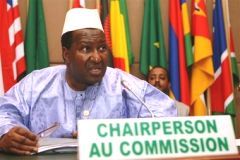Sudan under fire over Darfur at AU summit
Jan 29, 2007 (ADDIS ABABA) — Sudan came under immediate fire as an African Union summit opened on Monday and delegates said it may be blocked for a second time from chairing the organization because of abuses and bloodshed in Darfur.
 The AU’s top diplomat, Alpha Oumar Konare, criticised Sudan in his opening speech at the two-day summit, accusing Khartoum of attacking civilians in Darfur, where the United States says genocide has occurred.
The AU’s top diplomat, Alpha Oumar Konare, criticised Sudan in his opening speech at the two-day summit, accusing Khartoum of attacking civilians in Darfur, where the United States says genocide has occurred.
“We appeal to the government of Sudan to stop attacking and bombarding Darfur and instead restore peace,” he said.
Delegates at the summit said a deal was being discussed in a committee of seven respected presidents or “wise men” to hand the chairmanship to Ghana as a compromise candidate, coinciding with the 50th anniversary of its independence this year, and that Sudan might be willing to accept this.
Sudanese Minister for Presidential Affairs Bakri Hassan Saleh told Reuters: “It is still under discussion but this could be a possible solution.”
Sudan had seemed adamant on the eve of the summit that it should get the chairmanship, promised a year ago, despite a chorus of demands from rights organizations and Western governments that it be snubbed because of abuses in Darfur.
Sudanese Foreign Minister Lam Akol told Reuters: “I don’t expect responsible leaders of the AU to change their position because there are some rights groups outside the AU pressuring them. I think they are beyond pressure.”
But as the summit opened in the Ethiopian capital pressure was rising to prevent Sudan running the organization while the conflict continued in Darfur.
The chairmanship was promised to Sudanese President Omar al-Bashir a year ago but he was passed over for the post because of the violence in Darfur, which experts estimate has killed 200,000 people and driven 2.5 million from their homes.
Critics say that far from abating, the violence has worsened in the last year and government-backed Arab militias have killed thousands. Bashir has repeatedly blocked deployment of U.N. peacekeepers to bolster an overstretched African Union military mission of 7,000 soldiers and monitors.
CREDIBILITY
Rights group Amnesty International said in a statement on the eve of the two-day summit that the AU would undermine its credibility if it gave the chairmanship to Bashir while abuses continued in Sudan’s vast Western region.
Chad, whose relations with Sudan are severely strained after the Darfur conflict spilled over their border, has vowed to withdraw from the AU if Bashir gets the chair.
Asked at the summit opening what he would do if the chair went to Sudan, Chad President Idriss Deby said: “This is not a foreseeable step that would be taken by the African Union.”
Nigerian President Olusegun Obasanjo said: “I think we will have an easier solution to the question of the chairmanship than we did last year. The decision has not been made.”
Diplomats said Western governments were lobbying against Sudan and earlier had suggested Tanzania might be a compromise candidate, like Sudan from the east African region.
“(The AU) is one of the great success stories in international relations and diplomacy and it can be lost in half an hour. That’s what the AU needs to weigh up,” British Africa minister David Triesman told Reuters before the summit.
Delegates said the “wise men” committee, including Obasanjo, would present recommendations to the full summit.
The Addis Ababa meeting is also due to discuss raising a peacekeeping force for Somalia to replace Ethiopian troops, unrest in Guinea and climate change, as well as the AU military mission in Darfur, but diplomats say much of the debate has been overshadowed by Sudan.
Delegates said opposition to Sudan as AU chair was rising.
“How can you ask someone who is dealing with their own internal conflict to deal with all the other issues going on the continent? The leaders are taking this into account and a solution will be found,” one African delegate said.
(Reuters)
